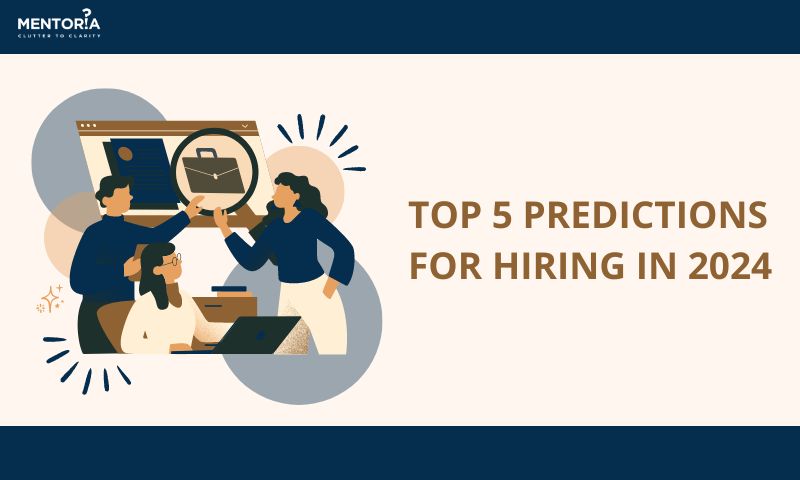Top 5 Hiring Predictions In 2024

Jump to Section
Ever wondered what hiring will look like in 2024? Will robots be conducting interviews? Will AI algorithms decide who gets the job? The future of hiring is set to be a blend of innovation and human touch. Companies are increasingly using AI to streamline their recruitment processes, from resume screening to candidate selection. AI tools are helping HR teams find the best people for the job faster, and virtual reality is changing how job seekers show off their skills. In this article, we’ll talk about the top predictions for hiring in 2024, looking at the trends that will change how companies hire and how people looking for jobs can deal with these changes. Let’s get started.
Increased Use Of Artificial Intelligence In Recruitment
In 2024, Artificial Intelligence (AI) will transform how companies hire new employees. AI tools will assist in finding the most suitable candidates for a job much faster than before. These tools use smart technology to analyse large amounts of information quickly and identify the best candidates. As a result, recruiters can focus more on important tasks instead of spending time on routine activities like resume screening.
For example, AI can review resumes and compare candidate qualifications with job requirements, which saves time during the initial screening process. Additionally, AI-powered recruitment platforms can analyse candidate behaviour during assessments and interviews. This analysis helps predict their future job performance, providing recruiters with valuable insights.
Another advantage is it can remove biases from the hiring process. When people hire, they might unknowingly favour or discriminate against certain candidates. But AI doesn’t do that. It makes fair decisions based on facts and data, so everyone has an equal chance.
As more companies see how helpful AI is in hiring, we’ll likely see a lot more AI tools being used in the future. HR departments that use these tools will find it easier to find the best people for the job, make their workplaces more diverse and inclusive, and help their companies succeed in 2024 and beyond. Let’s take a closer look:
- AI-Driven Candidate Insights: AI can provide recruiters with valuable insights into candidates’ skills, experiences, and potential fit for a role, helping them make more informed decisions during the hiring process. Recruiters can use these insights to tailor their approach to each candidate, increasing the likelihood of finding the right match for the job.
- Automated Candidate Engagement: AI-powered tools can automate candidate engagement, sending personalised messages and updates to keep candidates informed and engaged throughout the recruitment process. This can help create a positive candidate experience and improve the likelihood of attracting top talent.
- Enhanced Talent Pool Management: AI can help recruiters manage their talent pools more effectively by identifying and categorising candidates based on their skills, experience, and qualifications. Recruiters can easily access this information to quickly find suitable candidates for new job openings, saving time and resources.
- Improved Diversity And Inclusion: AI can help improve diversity and inclusion in the workplace by identifying and mitigating biases in the recruitment process. By using objective criteria, AI can ensure that all candidates are evaluated fairly, regardless of their background or characteristics.
- Ongoing Skill Enhancement: AI enables recruiters to continuously enhance their skills by offering insights into the latest recruitment trends and best practices. Recruiters can utilise this knowledge to refine their abilities and stay abreast of the most recent advancements in recruitment, thereby improving their ability to attract and secure top talent.
Emphasis On Diversity And Inclusion In Recruitment
In 2024, it will be crucial for companies to place a strong emphasis on inclusion and diversity. It’s no longer enough to simply meet diversity quotas; recruiters must actively work towards fostering an inclusive culture that appreciates and respects individual differences.
One way recruiters can do this is by actively seeking out diverse talent pools. They can ensure that job advertisements reach a wide range of candidates by posting openings on platforms that cater to underrepresented groups or by attending networking events that focus on diversity in the workplace.
Additionally, recruiters should take a closer look at their selection criteria to ensure that they are inclusive and unbiased. Implementing blind resume screening processes, where identifying information like names and photos are removed, can help eliminate unconscious biases and ensure a fair evaluation process for all candidates.
By prioritising diversity and inclusion in recruitment practices, companies can not only attract exceptional talent but also create a workplace where every individual feels valued and respected. This, in turn, can lead to increased employee engagement, improved performance, and a stronger, more innovative organisation overall. Some more insights are
- Mentorship And Support Programmes: Companies can establish mentorship and support programmes to help diverse employees navigate their careers and feel more included in the workplace. These programmes can pair new employees with experienced mentors who can provide guidance and support, ultimately helping them succeed in their roles.
- Flexible Work Arrangements: Offering flexible work arrangements, such as remote work or flexible hours, can help attract and retain diverse talent who may have unique scheduling needs. This can also create a more inclusive environment by accommodating employees with disabilities or caregiving responsibilities.
- Diverse Interview Panels: To ensure fairness in the hiring process, companies can form interview panels that reflect diverse backgrounds and perspectives. This practice helps reduce bias and offers a more holistic evaluation of candidates.
- Employee Resource Groups (ERGs): Establishing ERGs provides a supportive community for diverse employees, offering networking opportunities, professional development resources, and a platform to voice their opinions. ERGs contribute to a more inclusive workplace culture.
- Transparent Career Advancement Processes: Implementing transparent promotion and advancement processes based on merit and performance, rather than subjective criteria, ensures equal opportunities for career growth for all employees. This fosters a culture of inclusivity and fairness within the organisation.
Shift Towards Skill-Based Hiring Rather Than Degree-Based Hiring
Companies are changing the way they hire, moving away from focusing solely on specific degrees to prioritising skills. This shift acknowledges that having a degree doesn’t always mean having the necessary practical skills for a job. With technology advancing quickly and industries constantly changing, employers now value candidates who can show relevant, current skills. This shift benefits not only job seekers without traditional degrees but also helps companies create more diverse and versatile teams. Both employers and job seekers need to grasp the impact of this change on the recruitment process.
The tech industry is a prime example of how hiring practices have changed. In the past, tech companies heavily favoured candidates with computer science degrees. However, as the demand for tech talent has skyrocketed and the industry has evolved, employers now prioritise practical skills over formal education.
Take Google and IBM, for instance. They have implemented new strategies to identify and recruit candidates based on their skills rather than their degrees. Google, for example, no longer requires a college degree for certain technical roles. Instead, they look for candidates who can showcase their coding and problem-solving abilities through practical assessments.
- This shift in hiring has created opportunities for individuals from diverse backgrounds, including those who may not have pursued a traditional four-year degree. By focusing on skills, these companies can tap into a larger talent pool and ensure they hire candidates with the practical abilities needed to succeed in a fast-paced, ever-changing industry.
- Importance Of Practical Skills: Employers are placing a higher value on practical skills that directly apply to the job, such as coding, data analysis, or graphic design. Candidates who can demonstrate these skills through projects, portfolios, or practical assessments have a competitive edge over those with just a degree.
- Rise Of Alternative Education Paths: The availability of online courses, boot camps, and certifications has made it easier for individuals to acquire relevant skills without obtaining a traditional degree. Employers are increasingly recognising the value of these alternative education paths and are willing to consider candidates who have completed such programmes.
- Focus On Demonstrated Ability: Employers value candidates who can showcase their abilities through projects, internships, or work experience, rather than focusing solely on where they learned those skills. Employers want candidates who can demonstrate their skills in practical situations, no matter where they learned them from.
- Adaptability And Lifelong Learning: The shift towards skill-based hiring emphasises the importance of adaptability and lifelong learning. Employers value candidates who show a willingness and ability to learn new skills and adapt to new technologies and methodologies.
- Impact On Higher Education: This shift is impacting higher education institutions, as they may need to adapt their programmes to focus more on teaching practical, job-relevant skills. Universities and colleges are increasingly offering programmes and courses that align with industry needs and provide students with the skills employers are looking for.
Transparency With Salary Discussions
In the past, companies often waited until late in the interview process to talk about salary. However, this is changing. Some states now require employers to disclose salary information in job postings. This means candidates can see salary ranges upfront, helping them decide if the job is right for them. Even in states without these laws, it’s becoming more common to discuss salary earlier. Many workers say they wouldn’t apply for a job without knowing the pay range. Companies that include pay ranges in job listings tend to attract more candidates and higher-quality applicants.
As candidates have more access to salary information, recruiters need to be transparent about how pay decisions are made. This means refining strategies for introducing salary discussions earlier in the recruitment process.
- Importance Of Salary Transparency: Salary transparency helps build trust between employers and employees by providing clear and open communication about compensation. It can also help reduce pay gaps and promote fairness in the workplace by ensuring that employees are compensated fairly for their work.
- Impact On Candidate Attraction And Quality: Job postings that include salary ranges tend to attract more candidates and higher-quality applicants. Candidates are more likely to apply for a job when they know the salary range upfront, as it helps them gauge their potential value to the organisation.
- Need For Early Salary Discussions: With the increasing availability of salary information, candidates are more likely to expect early discussions about salary. Employers who delay salary discussions risk losing top talent to companies that are more transparent about their compensation packages.
- Strategies For Introducing Salary Discussions Early: Recruiters can introduce salary discussions early in the recruitment process by asking candidates about their salary expectations during initial screenings. They can also include salary information in job postings to attract candidates who are a good fit for the position and the salary range offered.
- Importance Of Refining Salary Negotiation Strategies: Recruiters need to refine their strategies for salary negotiations to account for candidates who are better informed about pay ranges. This may involve providing more detailed information about the salary structure within the organisation and highlighting the competitive benefits of working for the company.
Hiring Analytics Through Data-Driven Decision-Making
Using data-driven analytics is essential for improving hiring processes and making informed decisions in today’s human resources field. There are several key factors to consider in this important process.
- From Basic Data To In-Depth Analysis: 70% of corporate executives prioritise people analytics, leading to the establishment of variously sized and structured teams within major corporations.
- Challenges And Progress: Even though there is a lot of focus on enhancing data management and HR technologies, there is still a significant journey ahead to make the most of analytics. Several companies find it challenging to kickstart their workforce analytics capabilities, particularly in terms of data cleaning and optimising reporting.
- Build A Solid Database: Having a top-notch database is essential for recruitment efforts to thrive. Nevertheless, it is necessary to extract data from transactional systems, sanitise it, and reorganise it. Only then can it be utilised for analysis, ensuring uniformity in data collection and processing. The management of HR data systems demands significant resources, time, and investment.
- Use And Experiment With Data: Once a solid database is established, teams are free to delve into cutting-edge technologies that assist in analysing and sharing data. This unlocks boundless opportunities for developing business solutions tailored to the specific needs of every company. Whether it’s automated HR dashboards or customised software for self-service applications, the possibilities are limitless.
- Development Of Advanced Analytical Skills: Data scientists rely on programming languages like R, Python, and Julia to analyse intricate patterns and provide valuable insights for strategic decision-making. Teams proficient in descriptive and automated reporting can enhance their analytical skills even further.
- Scaling And Infrastructure Challenges: Setting up AI infrastructure can be tricky when it comes to scaling, and it might mean turning to cloud services. Some teams are sticking with their on-premises setup and don’t seem keen on moving their data to the cloud shortly.
Integration Of Social Media And Recruitment
Social media is now a big part of how companies find new employees. They use platforms like LinkedIn, Twitter, and Facebook to post job openings and connect with potential candidates. One great thing about using social media for hiring is that it helps companies reach more people. Unlike old ways like job boards or newspaper ads, social media lets companies find people who may not be actively job hunting but would be interested in a new opportunity. This means they have a better chance of finding the right person for the job.
Social media also lets recruiters talk to candidates right away. They can answer questions, give updates, and make the hiring process more personal and responsive. This makes candidates feel more valued and more likely to accept a job offer. Another benefit is that social media lets companies show off what makes them a great place to work. They can share stories, pictures, and videos that highlight their culture, values, and what it’s like to work there. This is important for attracting top talent who want to work for a company that fits their values and work style.
Overall, social media has changed the way companies find and connect with new employees. By using social media, companies can reach more candidates, engage with them in real time, and show off what makes them a great place to work.
Examples:
- LinkedIn: Lots of businesses utilise LinkedIn for sharing job opportunities and networking with experts in their field. Hiring managers can look for potential candidates using particular skills or experience, simplifying the process of finding suitable candidates.
- Twitter: Businesses can utilise Twitter to broadcast job vacancies to a wide range of individuals. Additionally, they can employ hashtags to connect with individuals who might not be current followers but are keen on job prospects.
- Facebook: Companies can make use of Facebook to create their career pages. These pages enable them to share job opportunities, showcase their company culture, and interact with potential candidates. Additionally, targeted advertising on Facebook allows companies to reach specific groups of individuals who share similar interests and demographics.
- Instagram: Some companies use Instagram to showcase their workplace culture through photos and videos. They can give potential candidates a behind-the-scenes look at what it’s like to work at the company, helping to attract candidates who align with their culture.
- YouTube: Businesses have the opportunity to leverage YouTube to produce videos that emphasise their employer brand and feature testimonials from employees. This can serve as a valuable asset in attracting top-notch talent who are seeking to join a company with a welcoming and positive work environment.
The Future Of Hiring
The hiring scene is expected to change in 2024. Although the future is uncertain, the 6 hiring trends listed earlier are expected to influence the upcoming year. By adopting these trends, recruiters can establish themselves as key players in promoting sustainable business expansion. Looking for more ideas on how to enhance your skills to align with the hiring trends in 2024?
If you need help, support, or some expert advice, Mentoria is here to assist you. Our team of experienced mentors is ready to guide personalised strategies and helpful tips to enhance your preparation. Don’t hesitate to reach out to us; we’ll be your guiding star on the path to success.











